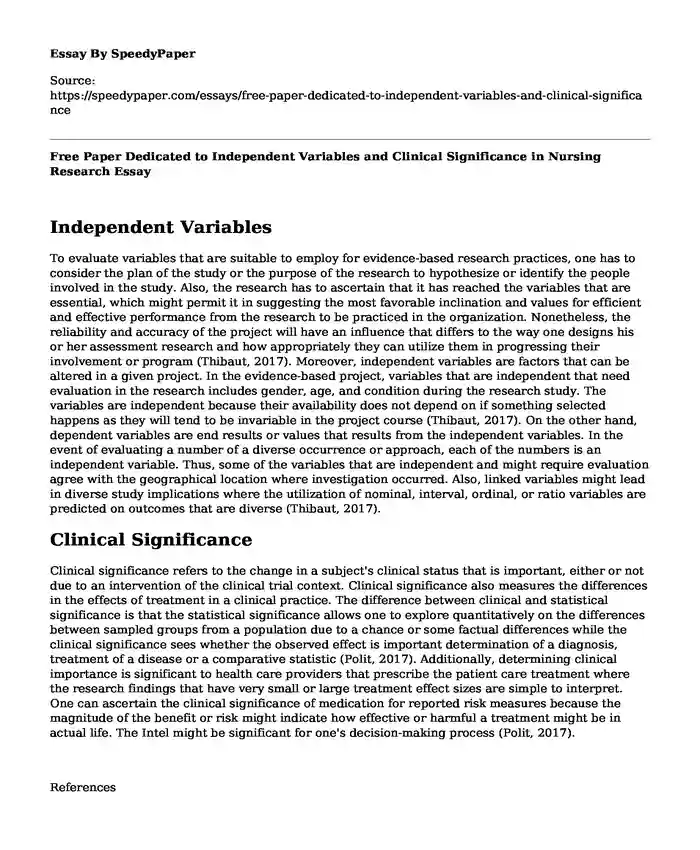Independent Variables
To evaluate variables that are suitable to employ for evidence-based research practices, one has to consider the plan of the study or the purpose of the research to hypothesize or identify the people involved in the study. Also, the research has to ascertain that it has reached the variables that are essential, which might permit it in suggesting the most favorable inclination and values for efficient and effective performance from the research to be practiced in the organization. Nonetheless, the reliability and accuracy of the project will have an influence that differs to the way one designs his or her assessment research and how appropriately they can utilize them in progressing their involvement or program (Thibaut, 2017). Moreover, independent variables are factors that can be altered in a given project. In the evidence-based project, variables that are independent that need evaluation in the research includes gender, age, and condition during the research study. The variables are independent because their availability does not depend on if something selected happens as they will tend to be invariable in the project course (Thibaut, 2017). On the other hand, dependent variables are end results or values that results from the independent variables. In the event of evaluating a number of a diverse occurrence or approach, each of the numbers is an independent variable. Thus, some of the variables that are independent and might require evaluation agree with the geographical location where investigation occurred. Also, linked variables might lead in diverse study implications where the utilization of nominal, interval, ordinal, or ratio variables are predicted on outcomes that are diverse (Thibaut, 2017).
Clinical Significance
Clinical significance refers to the change in a subject's clinical status that is important, either or not due to an intervention of the clinical trial context. Clinical significance also measures the differences in the effects of treatment in a clinical practice. The difference between clinical and statistical significance is that the statistical significance allows one to explore quantitatively on the differences between sampled groups from a population due to a chance or some factual differences while the clinical significance sees whether the observed effect is important determination of a diagnosis, treatment of a disease or a comparative statistic (Polit, 2017). Additionally, determining clinical importance is significant to health care providers that prescribe the patient care treatment where the research findings that have very small or large treatment effect sizes are simple to interpret. One can ascertain the clinical significance of medication for reported risk measures because the magnitude of the benefit or risk might indicate how effective or harmful a treatment might be in actual life. The Intel might be significant for one's decision-making process (Polit, 2017).
References
Polit, D. F. (2017). Clinical significance in nursing research: A discussion and descriptive analysis. International journal of nursing studies, 73, 17-23. Retrieved from https://pmj.bmj.com/content/77/905/201
Thibaut, J. W. (2017). The social psychology of groups. Routledge. Retrieved from https://libguides.usc.edu/writingguide/variables
Cite this page
Free Paper Dedicated to Independent Variables and Clinical Significance in Nursing Research. (2022, Aug 23). Retrieved from https://speedypaper.net/essays/free-paper-dedicated-to-independent-variables-and-clinical-significance
Request Removal
If you are the original author of this essay and no longer wish to have it published on the SpeedyPaper website, please click below to request its removal:
- Education Essay Sample on Promoting Learner Autonomy in EAP Courses for Arab Students
- A Lesson before Dying, Free Essay on the Novel
- Essay Sample on History of Florida
- How Culture Influence Communication - Free Paper with Annotated Bibliography on the Topic
- Essay Example: Anxiety Following Sports Injuries
- Topic Introduction: US - Iran Relations
- Big Data in Healthcare - Free Essay Example
Popular categories





